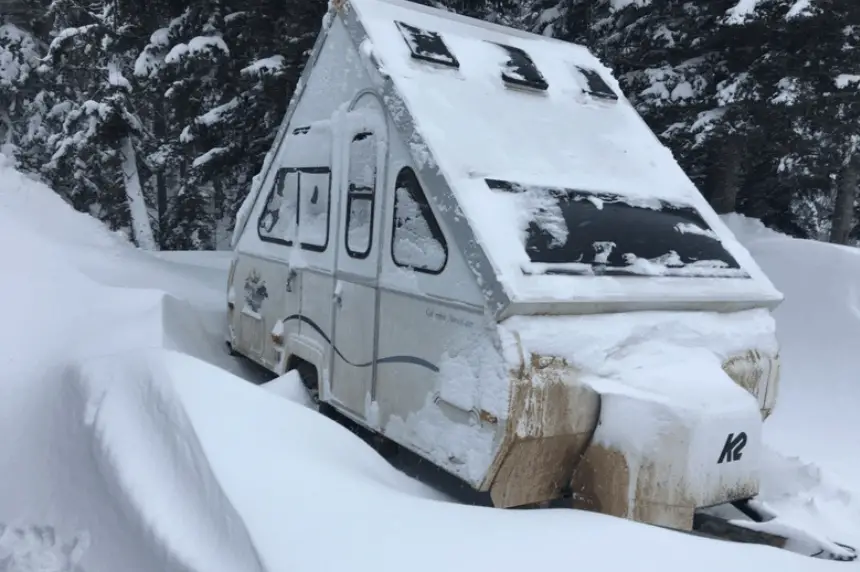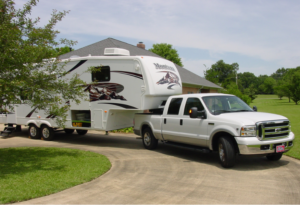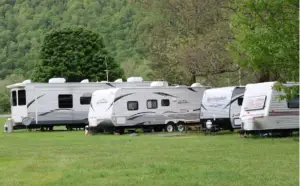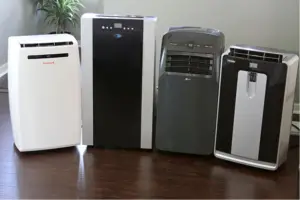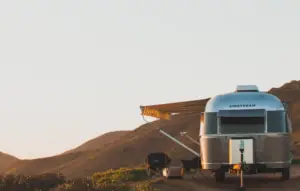Winter is harsh on things that are not sufficiently protected from the freezing cold. Your travel trailer or RV are prone to damage if you don’t take sufficient care to store them.
Winterizing travel trailer or RV is a task not everybody can fully understand. It is very important to make proper arrangements before you start the storage.
Only a RVer who couldn’t get his RV on road after winter storage due to damage, will appreciate the details in RV storage procedure.
Winterizing travel trailer or RV is an important factor, that will help you protect your Travel trailer or camper for long term. Freezing water, chilling cold waves could damage your travel trailer permanently and you may not be able to take it on road once spring arrives.
Storing a RV does not only mean having a a good roofing, it means a lot more than that. You need to take each storage step seriously and that will keep you worry free while the earth is freezing.
Steps for Winterizing travel trailer or RV
1. Decide on the Location for Storage
Deciding on the storing place for travel trailer in winter can be tricky. The best way to keep your travel trailer protected during the months of winter is to rent a storage unit.
This will keep away the snow accumulation on your RV and keep it safe from harsh winds and snow falls. This however, could be a costly option and not everyone will be willing to do this. You can use online storage finding applications to figure out where you can keep your RV.
If you are not opting for a paid storage unit then, the other option is to store the RV in your own parking area.
You should ideally place your RV under covered area. Avoid keeping RV under a tree or a place where grass could easily grow.
It will be better if you have a protected shelter that will keep the freezing winds and ice away from your RV or camper. Street parking of RV is subject to rules and regulation, so you need to be very sure and aware about it.
Using a Cover for your RV :
An ounce of prevention can save you pounds of repair. A Quality RV cover is all it takes to protect your RV, if you don’t rent a storage unit.
Not able to rent a storage place will mean your travel trailer will need some kind of shelter and a cover if possible. Covering your RV will protect it from snow accumulation and keep it safe to some extent.
It may not mean you leave the RV or travel trailer without monitoring it for months. You need to make sure snow does not accumulate too much else even the cover will not be able to protect the RV or camper.
You may buy the RV cover online but, putting it on could be a little problematic for a single person. Take necessary help from your family members so that you put it properly.
Make sure any sharp antennas or sharp edges do not tear apart the cover. Once you put the cover make sure all sides are properly covered.
You can also use plastic shovels to remove the ice or snow from gathering on the RV or camper. You will need help from your family members in doing this regularly and you will have to be brave enough to get out on those extremely cold days and clear the snow.
However, you may not be able to do away from heavy winds though. If you really plan to do it manually then make sure your roofs are not slippery. Either the RV cover or manual shove off the snow. Remember that the snow cover on top of RV can damage it.
Hence, it is important to monitor the travel trailer or RV regularly. Thumb rule in winterizing travel trailer or rv is to remain protective by periodic checks on the RV or travel trailer.
2. Thoroughly Clean the interiors in the RV
A very obvious and ignored thing about storing an RV is thoroughly cleaning your RV before you put it for storage. You also need to turn off the refrigerator during the storage time without fail, You need clean fridge; pantries and freezer unit.
Remove all food stuff including canned food. Not doing this may mean an open invitation to pests. Rodents and mice will attack your travel trailer if they figure out there are consumables in your trailer, no matter how less. And that would mean your RV or travel trailer could be their dancing floor.
Washing and cleaning the interior is important and so is washing exterior. Make sure you properly wash the RV from outside before storage. Make sure your RV or Camper is completely dry before your put it for storage.
3. Make sure batteries are safe and stored
Remove RV batteries and store in a secured place. Remember this is a important step in winterizing travel trailer or RV. Check the water level and make sure they are fully charged before storing them. Make sure you also keep them in dry place.
You should remove the negative terminal first while removing the battery. Batteries can drain quickly over months of storage and will be useless once you take out travel trailer or RV after the winter gets over. Also freezing can damage the batteries.
You can charge the batteries every month for few hours, this will keep them fresh and you can use them for next season. Ideally it is good to check the charge every few days and if the charge goes below 80% recharge them.
You can also use a mixture of baking sode and water to clean the batteries. Storing your batteries in concrete floor will discharge them much faster hecne avoid keeping them on concrete floor.
3. Pay special attention to the RV tires
You need to protect and take care of your RV’s tires while in storage. RV tires take those tones of load. They wear and tear all the time and now its time to take off that stress from them.
Make sure you keep something between the tires and ground or use a system that can lift the tires to some height. You can also cover the tires to protect them from UV rays. Make sure you inflate the tires before putting the RV in storage. Also, Tires tend loose pressure when in storage hence make sure you inflate them before using the RV again after winter.
4. Draining the water systems in RV or Camper
This is an important step before storing your RV or travel trailer. Make sure you drain out all water from systems. Make sure the storage tank is fully drained. Your entire plumbing system should be drained.
Washers, dryers or ice makers should also be winterized as per their manuals recommendations. You will have to empty both fresh as well as waste water. Try to get almost every drop out of your piping system.
This is an important step in winterizing your RV or travel trailer , so if you feel the need of trained professional; don’t hesitate in getting one . After all, your RV storage will help you in protecting it for next time use.
The grey and black water can cause odor in your RV and fresh water stagnate and pollute the pipes.All in all, these plumbing systems; if left unattended before storage can lead to damage that will cost you much more when you take your RV or travel trailer out once the winter gets over.
5. Plan for insects or mouse proofing
Insects or mouse are a potential damage makers. A small crack or opening to your rv could mean a welcome home for these creatures. Make sure you check for any such cracks and seal them on priority.
These insects or mouse will cause damage to your furniture, tear the sofa, chew the cabinetry and leave you with lots of annoying moments when your enter the RV during spring.
Working on to get the things damaged could be costly and is definitely cheaper and easier than preventing the insects from entering the RV in first place. You can fill the smaller holes or cracks using fillers like aluminum wool.
You can also use mouse traps or insect traps near tires. Propane attracts bees, spiders, wasps so make sure you seal off areas where propane scent could be found like stove burners.
Vent all other propane lines to keep these creatures away. Removing your propane tank could be an option to keep the propane lines free. But, this will mean you will have to store your tank separately.
6. Preparing your RV appliances and electrical for storage
Unplug all you appliances and turn off your main breaker. Cover Air Conditioner and clean its filter. Pay special attention to refrigerator. Firstly, it should be fully empty, no eatables should be left inside the refrigerator.
No chance to keep anything that is perishable or anything that can freeze. You could however keep some baking soda inside refrigerator, this has been seen as best for absorbing odors. Next thing is to keep the refrigerator door open. This would again help in keeping odors to some extent. completely defrost the freezer.

